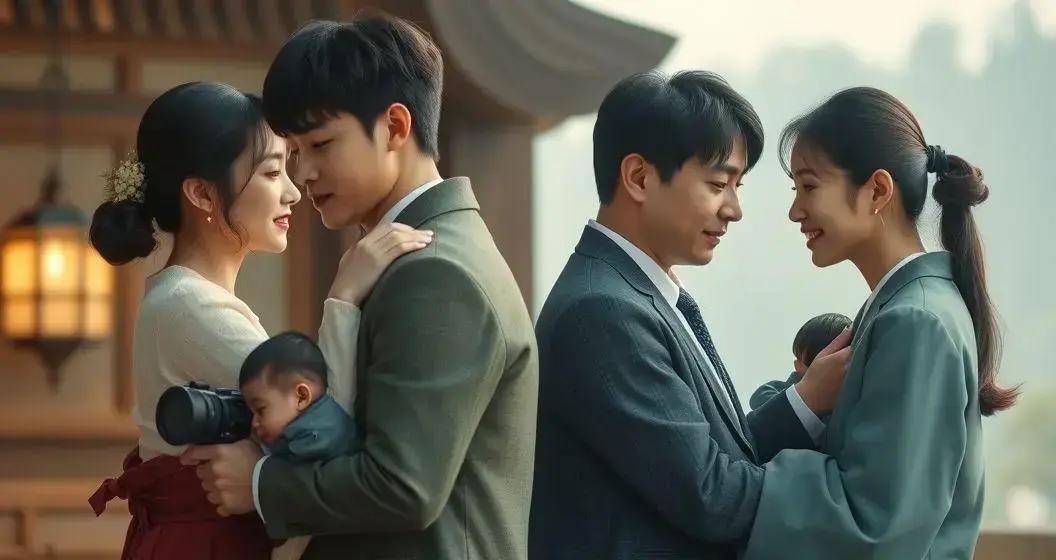K-drama Endings Explained: Unveiling the Mysteries Behind Popular Series
Advertisements
**K-drama endings explained** have captivated fans worldwide, with their mix of heart-wrenching emotions and unexpected plot twists. This article delves into the fascinating world of K-drama conclusions, revealing the secrets behind some of the most iconic series. We’ll explore themes, analyze unforgettable final episodes, and consider why these endings leave such lasting impressions. Dive in to discover how your favorite K-dramas’ climactic moments redefine storytelling!
The Most Shocking K-drama Endings Revealed
The Most Shocking K-drama Endings Revealed have left fans stunned and talking for weeks. Whether it’s a surprising character death or an unexpected plot twist, these endings redefine storytelling. One of the most famous shocks was in ‘Boys Over Flowers’, known for its dramatic last episode that altered its romantic narrative. Moreover, who can forget the jaw-dropping finale of ‘Goblin’, where fantasy intertwines with emotion in a way that few saw coming?
Some endings are shocking not just for their storylines but for the bold choices made by the creators. ‘Sky Castle’, a show about the pressures of elite education, left viewers speechless with its unexpected resolution that sparked discussions about societal values. Meanwhile, ‘It’s Okay to Not Be Okay’ captivated audiences with its unique take on love and healing, concluding with a heartfelt yet shocking twist.
Why Do Shocking Endings Work?
The element of surprise keeps audiences engaged and ensures that the show remains memorable. Shocking endings often propel the series to iconic status and fuel discussions on social media, thereby reaching a broader audience.
In conclusion, these dramatic endings resonate due to their bold narratives and unforgettable twists. It’s this unpredictability that keeps viewers hungry for more, ultimately contributing to the global appeal of K-dramas.
Common Themes in K-drama Conclusions

K-dramas often end with themes that are universally relatable, captivating audiences. Love and Redemption are prominent, with characters finding closure in relationships. For instance, in ‘Crash Landing on You’, viewers are drawn to the heartfelt reunion of star-crossed lovers facing impossible odds.
Another common theme is Personal Growth. Characters evolve as they surmount challenges. Whether it’s overcoming grief or finding inner peace, this journey resonates deeply, just like in ‘Healer’, where the protagonist matures while unraveling family secrets.
Fate and Destiny
Fate plays a significant role, often hinting at the belief that certain outcomes are meant to be. This is vividly portrayed in ‘My Love from the Star’, where a love story unfolds across time and space, guided by destiny.
Social Commentary is woven into many conclusions, addressing social issues subtly yet powerfully. In ‘Sky Castle’, for example, the finale sparks reflections on societal pressures and expectations, providing not just entertainment but a catalyst for discussion.
Friendship and Loyalty
The value of friendships is emphasized in many series. Endings showcase the strength and support provided by friends navigating life’s ups and downs, as seen in ‘Reply 1988’.
Why Do K-dramas Often Have Ambiguous Endings?
Ambiguous endings in K-dramas often leave viewers pondering, and that sense of uncertainty can be deliberate and meaningful. These conclusions challenge audiences to form their own interpretations, like in ‘Open Ending’, where viewers debate possible outcomes long after the final episode.
One reason for such endings is to reflect real-life complexity. Life rarely offers neat conclusions, and many K-dramas mirror this unpredictability. For instance, ‘Signal’ concludes with unresolved mysteries, much like a real-world cold case might remain unsolved.
Engaging the Audience
These endings invite active discussion, allowing fans to connect over theories and interpretations. This interaction keeps the drama relevant and even draws new viewers curious about the buzz.
Moreover, by leaving stories open-ended, creators can revisit characters and plots in sequels or spin-offs. This possibility is exciting for fans who hope for more content around their favorite series.
Ultimately, ambiguous endings resonate deeply because they offer more than entertainment; they inspire contemplation and community among viewers.
An Analysis of Iconic K-drama Final Episodes
![]()
Iconic K-drama final episodes often leave a lasting impact on audiences, leveraging emotional depth and narrative twists. ‘Goblin’ is a prime example, where the bittersweet ending masterfully blends love and sacrifice, bringing its characters’ journeys full circle.
In ‘Reply 1988’, the finale strikes a chord with a nostalgic exploration of friendship and family ties. The episode artfully wraps up story arcs while leaving some aspects open to interpretation, fostering viewer engagement.
Closure with a Twist
Some dramas, like ‘Boys Over Flowers’, give viewers closure through dramatic revelations that shift viewers’ perspectives. This approach keeps audiences guessing until the very end, adding layers to the story.
Character Redemption is another powerful element. In ‘It’s Okay to Not Be Okay’, the conclusion offers healing and redemption, allowing characters to grow and change, making the ending satisfying and transformative.
These final episodes resonate because they are crafted to evoke emotion, leaving an indelible mark on viewers and solidifying the drama’s place in popular culture.
How K-drama Endings Differ Across Genres
In K-dramas, endings often reflect the genre, creating distinct experiences for viewers. Romantic comedies tend to conclude with heartwarming scenes, where couples overcome obstacles to find happiness together. For instance, ‘What’s Wrong with Secretary Kim?’ ties up its storyline with a joyful promise of love and laughter.
Mystery and thriller dramas leave audiences on edge, frequently ending with cliffhangers or open-ended twists. Take ‘Stranger’, which leaves subtle clues of unresolved tensions, engaging fans with speculation and theories.
Period Dramas and Historical Settings
Period dramas often intertwine with historical events, concluding with a blend of fiction and history. ‘Mr. Sunshine’, for instance, uses its historical backdrop to craft a poignant story of sacrifice and patriotism.
In fantasy genres, endings explore supernatural elements, often using imaginative resolutions. For example, ‘Hotel Del Luna’ ends with a unique closure that bridges the living and spirit worlds, blending mystery with emotion.
Slice-of-life dramas typically depict everyday realities with an authentic touch. ‘Reply 1988’ ends on a nostalgic note, reflecting the charm and simplicity of growing up in a bygone era.
The Impact of K-drama Endings on Viewers

K-drama endings can deeply influence viewers, often leaving an emotional imprint that lingers long after the series concludes. These endings can evoke a strong emotional connection, with fans investing deeply in characters’ journeys. When a series like ‘Crash Landing on You’ ends on a hopeful note, it offers catharsis and happiness.
Many fans experience a sense of community through shared discussions and theories, especially with ambiguous or open-ended finales. Social media buzz becomes a virtual meeting ground where fans dissect every detail and forge friendships over mutual interests.
Impact on Viewing Habits
These powerful conclusions can influence future viewing choices, often swaying audiences to seek similar narratives. A well-crafted ending enhances a drama’s reputation, leading fans to explore more content by the same creators.
Moreover, K-drama endings sometimes introduce cultural insights, providing global audiences a glimpse into Korean society and traditions. For example, series that close with cultural festivals or traditional ceremonies offer an educational experience, fostering cultural appreciation.
Through impactful endings, K-dramas not only entertain but also enrich viewers’ perspectives, making them a significant force in global entertainment.
Unveiling the Power of K-drama Endings
K-drama endings possess a unique ability to captivate and resonate, with their memorable twists, emotional depth, and cultural nuance. They often blur lines between fantasy and reality, inviting viewers on a journey of emotional and intellectual engagement.
Through their powerful and varied conclusions, K-dramas explore universal themes that resonate across cultures, making them a cornerstone of global entertainment. Whether it is through shocking reveals, heartfelt resolutions, or open-ended mysteries, these endings ensure that K-dramas remain etched in the memory of their audience.
As the genre continues to evolve, its endings will undoubtedly keep captivating fans, enriching their connection to characters and stories, and leaving a lasting impact on the world stage.
